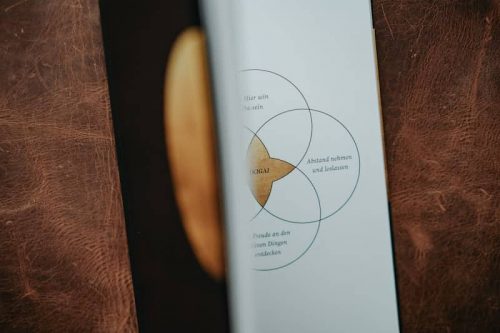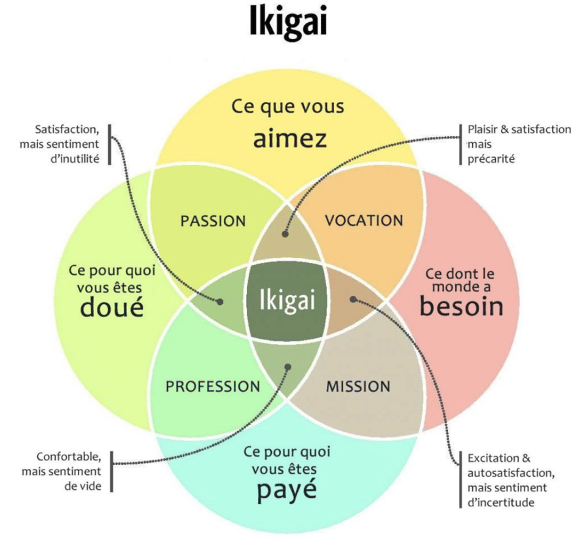
Ikigai or the method to find your way
What is my calling? What is the meaning of my life?
These are existential questions that many of us ask ourselves at one point or another in our lives. And which can resurface at any time.
Are you afraid of choosing the wrong career path? Or are you afraid of embarking on this or that project? In short, you are a bit lost and you are looking for your path.
Ikigai Can Help You. But What Is It Exactly?
The concept comes from the Okinawa archipelago in Japan, famous for its centenarians.
Ikigai comes from ikiru, which means "live" in Japanese, and kai, which represents the realization of what one hopes for. If there is no literal translation in French, we can define Ikigai as a philosophy of life, the equivalent of our reason for being or our joy of living.
As trendy as hygge, the Danish recipe for happiness (to learn more about hygge, here is my article on the subject Is Hygge the recipe for happiness?).
One aspect of ikigai concerns the relationship to work. The Japanese are not attached to the notion of “retirement” because they consider work as a potential source of pleasure and personal development.
This is why Ikigai is used in coaching today. Whether for people in professional retraining or simply when they feel lost, completely demotivated.
So how does Ikigai work in concrete terms? Deciphering this method in 4 steps.
Step 1: What you like to do
This first step takes time because it leads to several types of questions.
Start by making a list of everything that brings you joy on a daily basis, without restriction.
- What do you do without seeing the time pass?
- What do you do in your free time?
- What makes you happy?
- What books or magazines do you buy?
- What shows, reports, podcasts do you watch/listen to?
Write down everything that can attract you, make you curious, has a particular interest for you.
So take the time here to get closer to your emotions.
Activate your qualities, therefore, talents
We're talking about whatever comes naturally to you.
Activities that you are good at or enjoy doing (pleasure, motivation to do them).
To help you, think about all the talents, qualities, skills that your teachers, family, friends, colleagues, clients have seen in you and told you about.
Question your flow moments
Take a moment to think about what would correspond to your flow zones.
By this we mean those actions or activities where you lose track of time. Those activities that engage you deeply, where time passes quickly, where you are focused, creative etc.
These can be activities that you do every day, in all areas of your life (sometimes you don't have particular confidence in them).
Jen Sincero also talks about it in her book "You're gonna tear it up". She defines these moments frozen in time as “ “to be caught in the Vortex”.
Study your relationship with jealousy
We know that jealousy hides deep latent desire.
To determine what makes you jealous, creativity consultant and trainer Christie Vanbremeersch describes a three-step method in Psychologies Magazines, to identify it.
“Draw three columns on a sheet of paper or in your exercise book.
In the first column, write three reasons for jealousy. Don't censor yourself, it's normal to feel a little ashamed of writing down your petty things. Think of people (close or famous) who have that something that you think would give more meaning and pleasure to your life.
In the second column, write the desire which lies in your feeling of jealousy.
In the third column, write down the steps you could take., the actions you could take to move in the direction of this desire.”
Exploring your childhood
Return to your childhood dreams, when everything still seems possible, without parasitic reactions, fears, or obstacles to achieving them.
Start looking for what you were passionate about, what motivated you, what you enjoyed doing, and what you had skills or a gift for.
(Read, write, cook, garden, explain, take care, paint, draw, decorate, tinker, entertain, sing, dress up, make music, do sport, reconcile, dream, learn…)
Then list 5 things you liked to do as a child.
And ask yourself if these activities and things cause you regret today.
Step 2: What are you good at?
List what you are good at, what do you learn easily, what role do you feel good in? (Mediator, advisor, “fixer-all”…)
You may not always think about it consciously, but there are certainly many things you get complimented on.
It can also be for your human qualities: listening, patience, kindness or even altruism.
Identify areas in which you have specific skills.
Trying to answer these questions can help you:
- What are the compliments you receive most often, from your loved ones or colleagues?
- What activities can you do quickly and well?
- What are your specialties?

Step 3: What the world needs
Here you answer these types of questions:
- How can I be useful and contribute to the world?
- What impact could you have on the lives of those close to you? And on a larger scale?
- What causes would you like to defend?
- Who do I want to help? (humans, animals, nature etc.). Identify here missions that touch on the future
- What makes me angry or revolted?
- Or again, a little gloomy certainly, but which can be a trigger: how do I want people to describe me at my funeral?
Step 4: What you can get paid for
It is interesting to take stock of your professional skills here.
What are your daily missions?
What are you being paid for?
What other services could you claim to be paid for?
It's about taking a step back from your daily tasks, understanding what you're paid for and what you could also be paid for.
- What are your professional skills?
- If you were to start in freelance, what services could you offer?
- What tasks do you do in your current job? What have you learned to do?
- What training have you followed?
So ikigai is at the crossroads of these paths. Look at the bridges, links between certain information to see what comes out of it.
And if you still have trouble answering these 4 steps, you can test it online by answering a questionnaire to fill out (count a good 20-30 min all the same). It is about choosing between 4 descriptions the one that you like or corresponds to you the most and the least.
He will bring out the rosette of your Ikigai with what to turn to.
Whether it speaks to you or not, that's up to you, but it should fit your interests since everything starts from your preferences.
Link : https://ikigaitest.com/
Finally, if you want to know more about the subject, I invite you to read The Ikigai Method, discover your life mission (Solar) by Héctor Garcia and Francesc Miralles, two Spanish authors with a passion for Japan.
I also invite you to get my Workbook – Finding your IKigai (in English) which will help you through in-depth reflection exercises in order to find your vocation, your passions etc.
There you have it, you now have all the cards in hand to launch yourself into this introspection in order to try to think as best you can about what you want to do with your life.
Ikigai does not have all the answers, and will not necessarily tick all the boxes.
It is not immutable, and can change throughout your life, at the pace of your desires and projects.
Don't see this method as the miracle recipe for defining your ideal job.
But it can help you to know yourself better and see the areas and activities that you could exploit to guarantee your professional development.
I remind you that this is a philosophy of life and you can apply it to areas other than work, at any time in your life.
So grab a notebook and your pens!

